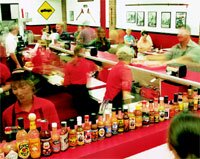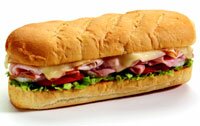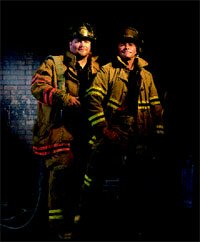|
Packing Heat
Firehouse Subs reels in franchisees with low start-up costs, high volumes and classic hot sandwiches.
By Maya Norris
All franchisee applicants interview with Firehouse Subs owners Kelly Harris (from l.), Chris Sorensen, Stephen Joost and Robin Sorensen as part of the chain’s lengthy approval and training process.

All franchisee applicants interview with Firehouse Subs owners Kelly Harris (from l.), Chris Sorensen, Stephen Joost and Robin Sorensen as part of the chain’s lengthy approval and training process. |
Brothers Robin and Chris Sorensen are used to taking risks. As firefighters for the Jacksonville Fire Department in Florida, they had regularly put their lives on the line.
So many close to them weren’t surprised when the former firefighters took another risk in 1994. Pooling about $30,000 from family and friends and using a credit card from Robin’s mother-in-law, the brothers launched Firehouse Subs, a fast-casual concept that serves steamed submarine sandwiches.
The gamble appears to be paying off. Firehouse Subs is burning through the Southeast. With 148 units in nine states, the Jacksonville, Fla.-based company is getting closer to its goal of becoming one of the top five sub chains by 2008, banking on its franchising system to grow the chain.
Hot from the Steamer
Firehouse Subs says it differentiates itself in the crowded sandwich segment by serving steamed subs with fresh, high-quality ingredients. Every day unit workers slice cheeses and fresh meats instead of using frozen cold cuts. The meats and cheeses are steamed and placed on a toasted roll.
The Engine Company Sub, $4.59 for medium and $6.19 for a large half-pounder, comes with smoked turkey breast, roast beef, melted Monterey Jack cheese, mayonnaise, mustard, lettuce, tomato, onion and a kosher dill pickle.

The Engine Company Sub, $4.59 for medium and $6.19 for a large half-pounder, comes with smoked turkey breast, roast beef, melted Monterey Jack cheese, mayonnaise, mustard, lettuce, tomato, onion and a kosher dill pickle. |
Best sellers include the Hook & Ladder Sub, $4.59 for medium and $6.19 for a large half-pounder, smoked turkey breast, Virginia honey ham, melted Monterey Jack cheese, mayonnaise, mustard, lettuce, tomato, onion and a kosher dill pickle; and the Firehouse Steak Sub, $4.79 for medium and $6.59 for a large half-pounder, slices of sauteed sirloin steak, onions and bell peppers, smothered with melted provolone. Food costs range from 33 percent to 35 percent.
The 1,500-square-foot units sport a fire-station theme that includes spotted tables similar to a Dalmatian’s spots, red and white walls accented with black chair rails, exposed brick columns and red quarry floor tiles. Fire trucks and hats, fire-station signs, and black-and-white photos of firefighters round out the decor.
Most units are located in strip centers anchored by major retailers like Wal-Mart. The company prefers sites in high-density areas with 30,000 to 50,000 people in a 3- to 5-mile radius. It targets 25- to 50-year-olds with household incomes of $50,000 or more.
On Fire
Firehouse Subs’ immediate expansion plans include opening 90 units this year in its current markets: Alabama, Arkansas, Florida, Georgia, Mississippi, North Carolina, South Carolina and Texas. Building on its Southeastern base, Firehouse plans to enter the mid-Atlantic region by the end of 2004 and then expand into the Northeast from 2005 to 2007. It intends to hit the Midwest in 2007 and the Western United States in 2008. The company’s long-term plan is to have 1,100 to 1,200 restaurants nationwide by 2008.
| SNAPSHOT |
| Concept |
| Firehouse Subs |
| Headquarters |
| Jacksonville, Fla. |
| Units |
| 30 company, 118 franchise |
| 2003 Systemwide Sales |
| $60.7 million |
| 2004 Systemwide Sales |
| $100 million (company estimate) |
| Average Unit Volume |
| $588,000 |
| Average Check |
| $7.25 |
| Expansion Plans |
| 90 in 2004, 120 in 2005 |
|
“This is a very well-thought-out development schedule. They’re going to be disciplined, and they’re going to develop regionally first, which is very smart,” explains Wallace Hite, managing partner of Dallas-based Weichmann-Hite Partners, a financial advisory boutique firm that specializes in the restaurant industry. “Concentric development is the best way to develop a brand.”
The bulk of Firehouse Subs’ growth is dependent on franchising through its area-representative program. From 2001 to 2003, 13 area representatives purchased the rights to open 676 restaurants over five years in existing markets as well as Virginia, Tennessee and Louisiana.
Human Resources
Although Firehouse Subs has sold the rights to more than 800 stores to area representatives, only 118 franchised units are open because the company has an extensive approval and training process for individual franchisees. “The most important decisions we make from this point out—because we’ve basically built the infrastructure—is who we’re letting in the system, because we’re only as good as our people,” says Stephen Joost, partner and chief financial officer and former chief financial officer of The Loop Pizza Grill in Jacksonville.
The franchising process at Firehouse Subs runs about six to 10 months from first inquiry to sale.
Area representatives first screen and approve franchise applicants. The potential franchisees then attend an orientation called Day of Discovery at corporate headquarters in Jacksonville and interview with the four principals: the Sorensens, Joost and Kelly Harris, chief operating officer and partner. If all four approve the applicants, each must submit an application and undergo a profile evaluation and background investigation.
Firehouse Subs’ 1,500-square-foot units feature a fire-station theme including a palette of red, white and black; exposed brick columns; and black-and-white photos of firefighters.

Firehouse Subs’ 1,500-square-foot units feature a fire-station theme including a palette of red, white and black; exposed brick columns; and black-and-white photos of firefighters. |
The potential franchisee must work 100 hours in a company store in every position so the company can evaluate his or her leadership characteristics. The franchise agreement is then executed, with the franchisee and area rep locating a site and signing a lease, which can take anywhere from two to three months.
The franchisees then work in an area rep’s stores for four to six weeks, learning day-to-day operations. Franchisees must also complete a two-week advanced program at a certification and training unit in Jacksonville to learn the administrative aspects of running a unit such as payroll and taking inventory. After completing the program, the franchisee is finally certified to open a Firehouse Subs restaurant.
High Volumes, Low Costs
Joost credits the company’s lengthy franchise process in part for Firehouse’s strong balance sheet. In 2003 systemwide sales reached $60.7 million, and same-store sales rose 5 percent. With a check average of $7.25, average unit volume tracks at $588,000. The company estimates that sales will increase to $100 million in 2004.
Franchisees are also attracted to the low start-up costs. Opening and development expenses for a 1,500-square-foot, 60-seat unit range from $140,000 to $180,000 with a one-time franchise fee of $20,000. The ongoing royalty fee is 6 percent of gross sales, and the marketing fee is 3 percent of gross sales. Area representatives receive half of all fees. Most franchisees have purchased the rights to develop five to 10 units over five years.
The best-selling Hook & Ladder Sub, $4.59 for medium and $6.19 for a large half-pounder, features smoked turkey breast and Virginia honey ham with melted Monterey Jack cheese, mayonnaise, mustard, lettuce, tomato and onion. It accounts for 40 percent of sales.

The best-selling Hook & Ladder Sub, $4.59 for medium and $6.19 for a large half-pounder, features smoked turkey breast and Virginia honey ham with melted Monterey Jack cheese, mayonnaise, mustard, lettuce, tomato and onion. It accounts for 40 percent of sales. |
“Our other restaurants cost us over a million dollars to build,” says Randy Kibler, an area representative for 30 stores in South Carolina and former president of Flagstar, Hardee’s largest franchisee with 600 units. “You can get into a Firehouse Subs for under $200,000 for the most part....For a small investment, the return is extremely good.”
Given the low start-up costs and high volumes, Firehouse Subs is an attractive investment, according to Craig Weichmann, managing partner at Weichmann-Hite Partners. “We know several [sandwich] concepts that will cost $175,000 to $225,000 and only generate $250,000 to $300,000 of sales,” he says. “So if I can plunk down $150,000 and generate about $580,000, wouldn’t I rather be in that system?”
In comparison, the average unit volume for QSR competitor Subway is $356,000, and Blimpie’s is $199,000. Fast-casual rival Quizno’s Classic Subs generates $421,000 per unit, and Jimmy John’s Gourmet Sandwich Shop earns an estimated $600,000.
The American Dream
As Firehouse Subs continues to expand, the chain is developing its own pool of franchisees with its American Dream Program. Launched in 2001, the program trains general managers to become franchise owners and guarantees them financing for a franchised unit. GMs invest $5,000 to participate. For two to three years, the managers learn all the aspects of being a franchise owner by running company units. They supplement their on-the-job training with business classes at headquarters on topics such as accounting principles and lease negotiations. In return, they receive 18 percent of the cash flow from their stores in addition to their base salary of $500 a week. Their take-home can increase about $24,000 to $35,000 because sales at those stores usually go up approximately 30 percent to 40 percent, according to Joost.

Risky Business: In 1994, brothers and former firefighters Robin (l.) and Chris Sorensen launched Firehouse Subs, a fast-casual concept that has since grown to 148 units throughout the Southeast and Texas. |
“They’ve got an incentive to not only save money but to drive sales and to stay longer and keep their labor costs and food costs under control, because half of their salary or more is going to come out of that profit and ownership interest,” Joost says.
In addition, the company reduced labor costs by 5 percent because it no longer needed supervisors to check on the stores.
“It’s an outstanding return when you think [the $5,000 investment] really is a pittance, because when your store is doing well, you’ll pay that back to yourself within a matter of months,” says Don Baird, a 2003 graduate of the American Dream Program’s first class. Baird worked at a company unit in San Marco, Fla., increasing the store’s sales by $3,000 a week. As a result, he earned $24,000 a year in addition to his base salary.
At the end of the program, the company buys back the $5,000 interest and helps the graduates obtain $150,000 to finance their franchised units by cosigning their loans or lending them the money. “If they can get the loan on their own, that’s fine,” says Joost. “If they can’t, that’s where we come in, and we put our name, faith and credit on the line. We’re putting our faith in that person.”
Firehouse cosigned a loan for $150,000 to help Baird purchase a unit in Little Rock, Ark., in September 2003. “[The American Dream Program] allowed a person like myself to succeed where as I would not have had that trail,” Baird says. “I couldn’t have walked into a bank and said I need a loan for this amount of money.” Four of the five other graduates in Baird’s class have purchased at least one unit with financing help from Firehouse Subs; one graduate obtained a loan on his own.
Each GM of the 30 company restaurants will participate in the next class of the American Dream Program, which will start in October.
| MENU SAMPLER |
| Hot Specialty Subs |
| Oven-Baked Meatball Sub: Italian meatballs with marinara sauce, melted provolone cheese and Italian seasonings, $4.59 medium, $6.19 large half-pounder |
| Firehouse “Hero” Sub: roast beef, smoked turkey breast and Virginia honey ham topped with melted provolone cheese, mayonnaise, mustard, lettuce, tomato, onion and a kosher dill pickle, $4.89 medium, $6.29 large half-pounder |
| Old-Fashioned Sandwiches |
| Corned Beef Brisket sandwich, served cold with choice of bread and cheese, with mayonnaise, mustard, lettuce, tomato, onion and a kosher dill pickle, $4.29 |
|
“It is the wave of the future,” Hite says. “People who don’t recognize that probably are missing the point of the old adage, owners work better than employees.”
Risky Business: In 1994, brothers and former firefighters Robin (l.) and Chris Sorensen launched Firehouse Subs, a fast-casual concept that has since grown to 148 units throughout the Southeast and Texas.
Although Weichmann and Hite believe the early results of the American Dream Program can spur growth by building a strong, predictable franchise base, it’s still too early to tell if the program will deliver long-term success. “It’s a bold initiative by the organization. I think it’s got a tremendous amount of potential,” Weichmann says. “But the real question will be five years from now when you check how the graduates are performing.”
Quantity and Quality
In the meantime, Firehouse Subs is concentrating on aggressively selling more territories to area representatives. In April, Kibler and four other existing area representatives formed Southeastern Interstate Group to purchase the rights to 163 new stores in Georgia, Tennessee and North Carolina, the largest franchise territory Firehouse has sold. Michael Pietrzyk, a former Little Caesar’s franchisee, bought the rights to 60 stores in central and southern Virginia in May. Firehouse Subs expects to sell the rights to 130 more stores in Texas this year. The company will open six stores by the end of the year in the greater Jacksonville area.
While Firehouse Subs measures its success by the number of stores it opens, the chain recognizes that the quality of the units and the people running those units are just as crucial.
“We’re never going to sacrifice product quality. We’re always going to try to pick the absolute best area reps and franchisees for the system and not take the quick buck to sell it,” Joost says. “You wouldn’t believe the millions of dollars we’ve literally turned down from people that want to buy Firehouse Subs. We’ve stuck to our guns and made decisions for the long term.”
|

